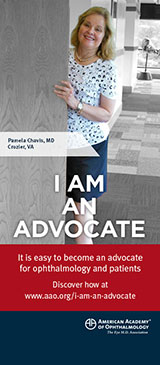 I cannot imagine any career I would love as much as ophthalmology and neuro-ophthamology. As much as I loved neuro-ophthalmology when I began my medical career, the surprise is that I loved it even more over time. There are not many professions that nurture and grow its participants in this way.
I cannot imagine any career I would love as much as ophthalmology and neuro-ophthamology. As much as I loved neuro-ophthalmology when I began my medical career, the surprise is that I loved it even more over time. There are not many professions that nurture and grow its participants in this way.
Over the years it has felt important to give back to the gift. It has been a pleasure to serve as president of the Women’s Physician Section for the Medical Society of Virginia, among other roles. One crucial role was addressing Virginia House Bill 856, an optometric scope-expansion bill, before the state Senate Subcommittee on Health during a hearing in February 2004. I represented the Virginia Society of Ophthalmology (now the Virginia Society of Eye Physicians and Surgeons) and the Medical Society of Virginia. An able team, including the president of the VSO, clarified the ophthalmic concerns with the bill. The chairman of the subcommittee gave his ruling and informed the optometrists not to bring any bills like this back soon. Soon, however, can be a relative term.
It is time to ensure — as much as possible — our profession for the next physician generation, and to protect our patients and their care. The Academy’s advocacy program gives structure to this effort, as well as offers direction that is purposeful and effective. The program really continues the advocacy that we have done 1:1 with patients, as we have worked to ensure their care. However, the advocacy program broadens our scope and potential. Certainly, for some time now our 1:1 patient relationship has become 1:1:faceless representative of health care programs, as we have had to obtain approval for testing and procedures. Sadly, the quality of patient care has never felt as threatened as it does today.
We were successful against the optometric bill in Virginia because we took the time to meet with the legislative assistants of the state senators, to explain the patient-care issues. It was these successful encounters that helped structure the overall approach that was the key to our ultimate success. It was wonderful to see their commitment to their constituents and their understanding of the legislative process.
Last month, during Congressional Advocacy Day on Capitol Hill another legislative assistant made a canny suggestion on accomplishing an Academy goal. Their dedication, coupled with their youth and energy, is really fantastic to observe and enjoy. However, the legislative assistants have to know the facts in order to act correctly. Through the Academy’s advocacy program, information is communicated and relationships are established that can work down the road.
Pamela S. Chavis, MD, is a retired neuro-ophthalmologist.